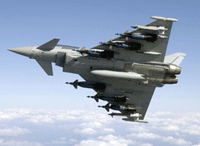
Defence giants rack up $500bn in incentive deals
Farnborough, July 10, 2012
Global aerospace and defence companies have racked up a cumulative $500 billion of obligations in order to secure weapons sales with foreign countries through 2016, according to a leading consulting firm.
Jon Barney, a partner with Avascent, said the huge and rising bill for so-called 'offset' agreements presented an unprecedented challenge given that many big defense companies are now looking to foreign sales to keep revenues growing as military spending declines in the US and Europe.
Offsets, which first appeared after World War Two, are incentive contracts that weapons makers sign with procuring governments to facilitate arms sales. They often take the form of investments in the buying country's own defense industry, but they vary widely in form and complexity.
Barney said many countries were ratcheting up their demands for such agreements, even on smaller weapons deals, but that aerospace and defense firms often lacked a strategic approach to the issue, leaving oversight to lower-level executives and treating offset agreements on a case-by-case basis.
The lack of oversight created 'unnecessary risks' for companies, and prompted Avascent to study the issue for nearly a year, Barney said, resulting in what he described as the first comprehensive estimate of offset agreements across the sector.
Previous industry estimates had put the total at about a fifth of the level calculated by Avascent.
While incentive deals are growing in number and complexity, the United States, Britain and other countries are also increasing their efforts to crack down on corruption, with offset agreements seen as a particularly fertile area.
Barney said taking a proactive, transparent and strategic approach to the issue could be an important 'differentiator' for companies as they bid to supply fighter planes, warships and other military equipment.
On the flip side, companies that failed to impose strategic and analytical rigor on their offset proposals could be at a competitive disadvantage and open themselves to unnecessary financial and reputational risk, the study found.
Barney said he advised companies to treat offsets as seriously as they would the due diligence exercises conducted before they initiated talks on mergers and acquisitions.
Using past and projected future arms sales, the Avascent study estimated that about $214 billion in offset obligations were generated around the world from 2005 to 2011, but a large portion remained outstanding.
Driven by strong spending in the Middle East, Asia and Latin America, companies were likely accumulate an additional $225 billion in obligations on new sales through 2016, it said.
Saudi Arabia, the UAE and other countries in the Middle East are huge drivers of offset agreements. Avascent estimated that new obligations from countries in the region were about $12 billion in 2011 and would reach $156 billion by 2016.
In Asia, companies agreed to offset investments valued at around $10 billion in 2011, with South Korea and India accounting for about 60 percent of the total. Singapore, Malaysia, and Taiwan also had demanding offset expectations, Avascent said. The cumulative total for the region was seen at $122 billion through 2016.
Slower spending patterns in Europe would slow growth in European weapons deals and any offset agreements, but new obligations were still expected to total $118 billion from 2005 to 2016, Avascent said.
Latin America was showing the highest growth rates in offsets, driven largely by modernization efforts in Brazil, Colombia, and Chile, Avascent said. From 2005 to 2016, total obligations would reach about $41 billion.-Reuters







